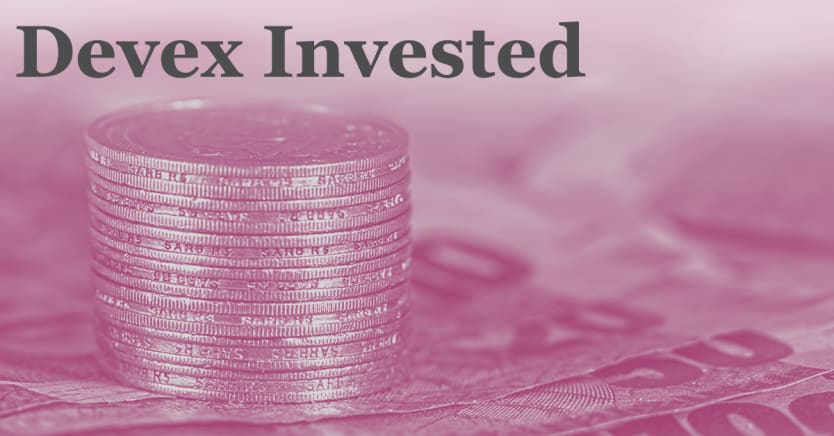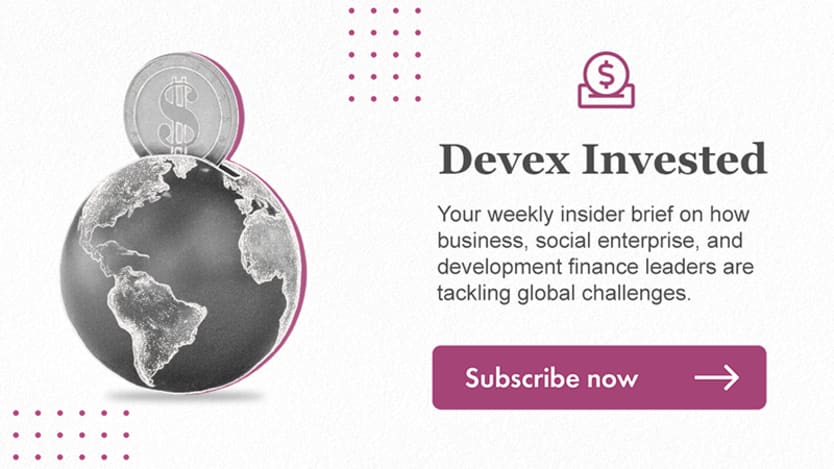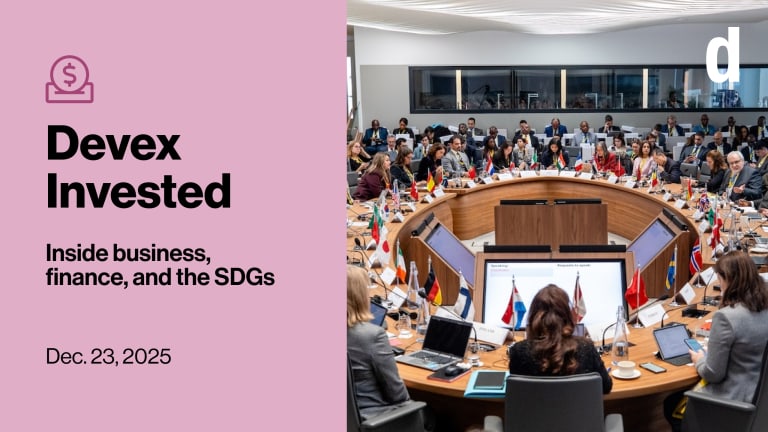
Last week, we brought you a look at the performance of Village Enterprise’s development impact bond, with successful results announced in Kenya and Uganda despite the challenges of the COVID-19 pandemic.
This week I’m taking a bit of a step back, as it’s been about a decade since early DIB experiments began. Two dozen DIBs have launched in low- and middle-income countries since then, primarily focused on health, education, and livelihoods.
This is a preview of Devex Invested
Sign up to this weekly newsletter inside business, finance, and the SDGs, in your inbox every Tuesday.
• When should DIBs be used? In complex situations, with complex populations, and for complex needs, says Louise Savell, a co-founder of Social Finance and a joint lead of its international development team. While DIBs are never going to be “massive,” they can be effective tools to support local implementation, and they’re best for reaching the 20% of the population “you’ve been struggling with,” she tells my colleague David Ainsworth.
• Outcomes-based contracts can help LMICs justify trying a new approach, because governments won’t have to use their constrained resources to pay if results aren’t achieved. “Government policy is like an oil tanker, and we’re in the business of turning an oil tanker around,” Savell said, adding that more money should be dedicated to these mechanisms.
• To date, the involvement of big government donors has been limited, though FCDO has been running a DIB pilot program since 2017. With each of the DIBs or impact funds it has supported through the pilot, the U.K. government department has commissioned an independent evaluation to determine whether it improves aid effectiveness and efficiency. But the results aren’t in yet, Charlie Morgan, an impact bond specialist at FCDO, tells me.
• Initially, DFID — which merged with the Foreign & Commonwealth Office in 2020 to create FCDO — had planned a larger program focused on outcomes funds that would pool resources from multiple donors as a sort of “bank” for impact bonds, Morgan says. But “funding cuts scaled down ambition,” she tells me.
• FCDO has supported several bonds and is engaged with two outcomes funds working on education: one in Sierra Leone and one in Ghana. “We’re keen to do more funds in other areas. But at the moment, it has not been possible,” Morgan says.
DIBs: What we’ve learned 10 years on
And ICYMI: DIB in Uganda, Kenya hits targets despite COVID-19
US foreign aid funding foibles
Last week, the U.S. Congress finally passed its fiscal year 2022 budget — and yes, we’re approaching the halfway point in the fiscal year. The top-line numbers, which amount to about a 1% increase for foreign affairs from fiscal 2021 funding, were a disappointment for development advocates who expected much more.
The politics of the appropriations process also meant that language about the U.S. transferring IMF Special Drawing Rights was stripped from the bill, a person close to the process tells me. The SDRs could have been a vital resource for COVID-19 response in low-income countries.
Other parts of the bill to note:
• Congress rescinded about $515 million of unobligated Millennium Challenge Corporation funds.
• The U.S. International Development Finance Corporation is one of the winners in the budget, with a $129 million increase for a total of $702 million in funding.
• While House and Senate versions of the bill included funding for the Green Climate Fund. The final version includes none.
Read: The US foreign affairs budget and what comes next
Second place
$28.4 billion
—That was Germany’s official development assistance in 2020, amounting to about 0.73% of its gross national income.
The country now spends more on global development and humanitarian aid than any other nation aside from the United States. Here’s a primer for understanding Germany’s development work.
Devex Pro: A primer on German aid
+ Devex Pro subscribers can also get insights about what the post-Merkel coalition government could mean for Germany's development ministry and about the background of Svenja Schulze, Germany’s new development minister. Not gone Pro yet? Sign up and start your 15-day free trial.
Lending in limbo?
Hungary is blocking the completion of an agreement between the EU and 79 countries from the Organisation of African, Caribbean and Pacific States over the issue of migration, my colleague Vince Chadwick reports.
Without the deal, the legal basis for the EU’s relationship with OACPS could soon expire, potentially jeopardizing both the European Investment Bank’s mandate to lend in those countries and dialogue forums with the EU, according to one official.
Devex Pro: How Hungary is keeping Brussels' post-Cotonou agreement in limbo
What we’re reading
As philanthropy grows, so do limits on cross-border giving. [Devex]
UNICEF match fund aims to catalyze domestic resources for malnutrition. [Devex]
A look at how UNDP’s SDG impact standards can help corporate boards. [Sustainable Views]
JSE, which runs Africa’s biggest stock and bond exchanges, has changed its listing requirements to allow ESG and sustainability debt instruments. [Bloomberg]









